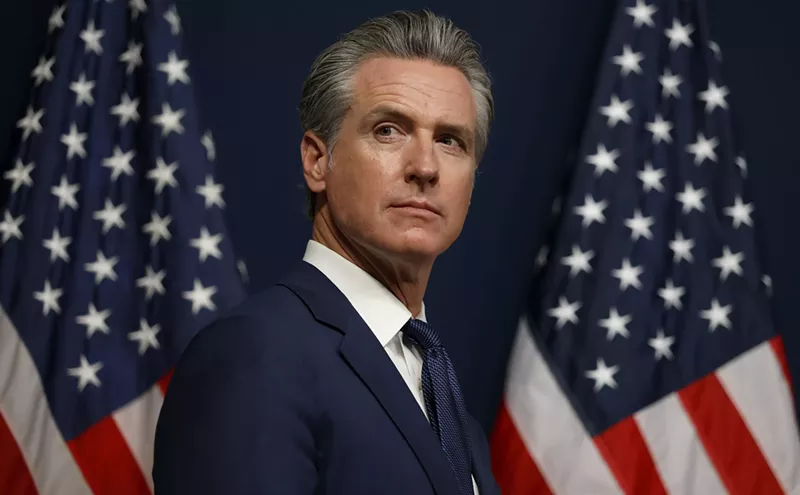In Hollywood, if you can commandeer the audience's grand-scale pop fantasies--originate, even, some of those fantasies--you get labeled a high priest, a visionary. With Schindler's List, Spielberg's usual pop cult following was supplanted by a new crowd of incense burners. The film was hailed as the work of a when-you-wish-upon-a-star boychik who finally came of age. It brought him "respectability." Hollywood denied E.T. the Best Picture Oscar it deserved, but it had no problem showering awards on Schindler's List. What, after all, could be more redemptive than a Holocaust drama by Hollywood's reigning Merlin/Midas?
With Schindler's List, Spielberg was recast in the popular imagination as a kind of Stanley Kramer with genius. He took the Holocaust and worked his whizbang, popularizing magic until audiences were as caught up in its terrors as they once had been ducking sharks off Martha's Vineyard. The film didn't do justice to the psychological complexities in the Thomas Kenneally novel, but it was such a powerfully engineered experience that it achieved if not greatness, then at least a reasonable facsimile.
But in '93, Spielberg also came out with Jurassic Park, the film he agreed to make first in order to be allowed Schindler's List. The yin and yang of having these films back to back in the same year is a great, sick Hollywood joke: It says you can get to the concentration camps only by first tramping through the playgrounds of dinosaur parks. Jurassic Park was a monumentally banal boo! movie made by a director who realized he didn't need to stretch himself in order to juice the audience. His fabled finesse never seemed so auto-piloted.
Giving interviews about Jurassic Park prior to the release of Schindler's List, Spielberg seemed almost to be joining the film's denigrators. He noted the shrewdness in Universal's decision to green-light Schindler's List only after he agreed to make Jurassic Park first. Both he and the studio recognized that producing these films in reverse order would have required for him an almost impossible dislocation of mood.
That was four years ago, during which time Spielberg has busied himself producing or coproducing other people's films (The Bridges of Madison County, Twister), helping to develop TV's ER, establishing the Survivors of the Shoah Visual History Foundation, and cofounding a ballyhooed new studio, DreamWorks SKG. He also readied two films he was to direct for 1997: The Lost World: Jurassic Park, opening for Memorial Day weekend, and a slave-ship epic, Amistad, which is scheduled for release in December.
Sounds like yin and yang all over again.
For now all we have is the yin. The Lost World is a smoother, scarier ride than its predecessor, with twice as many dinosaurs twice as well designed eating twice as many people. Spielberg is not about to screw up the Jurassic franchise by pretending it's Schindler's List.
But he's not particularly playful with his terrors here, and that's a disappointment coming from a filmmaker who can mix scares and laughs the way no one else ever has. One of the great things about Jaws, for example, was how funny its frights were. Spielberg was such a confident maniac in that film that the visual jolts he cooked up with his editor, Verna Fields, were in themselves a source of high amusement. He was a jester sadist who tickled us not with a feather but with a shiv.
He secured his scares with a loony allegory aboard the shark-hunting boat. Between Richard Dreyfuss' game, gallant ichthyologist and Robert Shaw's bonkers, macho captain, there was a kind of generational vaudeville being played out--a vaudeville about two styles of heroism. Dreyfuss' style--dedicated, yet not too proud to cringe--felt as right to young audiences of that era as did Elliott Gould's shambling, valiant Philip Marlowe in Robert Altman's The Long Goodbye. In the context of a funny scare picture, what counterculture audiences were responding to was a new way to be heroic on screen--a way that did justice to our funky, unheroic selves. The film was like a warrior fantasy for pacifists--the guy who gets sand kicked in his face saves the beach. Jaws would not have worked half as well as a great scare picture if that nutty little confab between Dreyfuss and Shaw weren't its centerpiece.
For The Lost World, Spielberg at least recognizes the need to diddle its heroics Jaws-style by placing at its center Jeff Goldblum's facetious chaos-theory mathematician Ian Malcolm. Ian was also in Jurassic Park, but in a subordinate, wiseass role; he was the film's geek chorus. Here he's not so geeky, and the more standard his heroism becomes, the less special he, and the film, seem.
Ian's experience with the dinosaurs from his previous tour of duty has made him something of an expert in jungle law. He doesn't want to end up dino chow, and he spends a fair amount of time making sure the people he cares about--especially his paleontologist girlfriend Sarah Harding (Julianne Moore) and errant daughter Kelly (Vanessa Lee Chester)--don't also end up on the menu.
What has brought him back into the fray in The Lost World is a summons from Richard Attenborough's John Hammond, ailing and vulnerable to a hostile takeover of his InGen Corporation by his mercenary nephew, Peter Ludlow (Arliss Howard). It seems that Isla Nubar--the site of the destroyed Jurassic Park--was not InGen's only dinosaur habitat. Nearby Isla Sorna was the real dinosaur breeding ground, and a hurricane there has set its species free.
Ludlow is en route with big-game hunters, headed by the piratical, bald-pated Roland Tembo (Pete Postlethwaite), to deliver up a tyrannosaur as a stateside attraction in San Diego. Hammond--a venture capitalist turned born-again naturalist in four short years--wants to offer up for study the dinosaurs in their free habitat and, to that end, has already brought Sarah onto the island alone. To rescue her, Ian agrees to head a convoy with Greenpeace environmentalist Nick Van Owen (Vince Vaughn) and techno whiz Eddie Carr (Richard Schiff), both of them unprepared for anything larger than an iguana until they clap eyes on Sarah petting an Ultrasaurus. (At least I think that's what it was.)
With Ludlow, Tembo, and company facing off against Ian and his entourage, The Lost World is set up to be one swinging safari. But Spielberg, working from a script by David Koepp very loosely adapted from Michael Crichton's novel, offers up crash-and-thud heroics with, at best, a slight twirl. He has dampened his own best instincts telling him action is only as good as character. The hunters and greedsters and Greenpeacers in The Lost World are more flavorful than the stalwarts and walking stiffs in Jurassic Park, but they're still pretty stolid. They aren't part of some larger funnier pageant the way Dreyfuss and Shaw were in Jaws. They aren't playing around with what it means to be a hero.
There's a perfect missed opportunity for such play when, in order to survive on Isla Sorna, the naturalists and the hunters have to band together. The collision of manias ought to bring out Spielberg's love of bughouse duels, but it could be that he's become too "responsible," too much the Greenpeacer himself, to balance both sides. One of the funny things about Robert Shaw's captain in Jaws was that, macho cartoon that he was, you could still relish his predator's leer. With Shaw around, you wanted the shark to win, but you also wanted to see Shaw win too--anybody that loony about his virility deserves some kind of commendation.
Postlethwaite's Tembo is Shaw-like--he wants to take down the T. rex because it's the greatest killing machine of all time--but with him we don't get into the slapstick of blood lust the way we did with Shaw. He's just a scary safari guy. (The Greenpeacer disparagingly refers to him as "Ahab," but that's giving him way too much credit.) Spielberg has called The Lost World a movie "about hunters versus gatherers," but he has lost sight, as he never did in Jaws, of how much more we enjoy the hunters than the goody-goody gatherers. He and his team of special-effects mavens--including live-action dinosaur designer Stan Winston, full-motion designer Dennis Muren, and dinosaur effects chief Michael Lantieri--have come up with the most startling and hideously detailed dinos ever seen in a movie; and yet the film doesn't have the wit to encourage the audience's predatory instincts.
It could be that since Indiana Jones and the Temple of Doom Spielberg has been gun-shy about venting his comic heartlessness. And he does need to be careful; Temple of Doom, with its torchings and maulings, was a poisonously nasty thrill ride. But in the context of The Lost World, as in Jurassic Park, a little nastiness can be tonic. It helps put a lid on all the high-flown Crichton-esque blather about cloning and extinction and how "life will find a way."
The best tonic is at the beginning: The film opens with a little girl wandering off from her parents on Isla Sorna and being set upon by the compsognathuses--little chickenlike, dagger-toothed, green dinos. It raises one's hopes that Spielberg is going to ditch the amenities and get down and dirty.
That never really happens. We're treated to some marvelous set-pieces, including a scene in which Ian, Nick, and Sarah are dangling off a cliff in their 60-foot double trailer as a pair of tyrannosaurs try to nudge them into oblivion. But throughout the mayhem runs a thick stream of sap. Those tyrannosaurs, for example, aren't such bad sorts; it's just that the people in the trailer tried to fix the broken leg of their baby and--well, it's just a great big misunderstanding. Elsewhere we are told that humans are the only species that hunts when not hungry--a factoid that doesn't jibe with what we're seeing, but sounds politically correct. They should call this film One Million Years P.C. Its Lost World is an idyllic habitat turned shooting gallery, and the culprit is--of course--man.
Just in case we don't get the point, there's a scene in which Dieter, one of the scurviest of the hunters (played by Fargo's Peter Stormare), approaches a baby dino and is informed that because dinosaurs don't know humans, they don't fear them--whereupon Dieter zaps the critter and says, "Now they do." (Want to guess what happens to him?)
In Jurassic Park the sap ran even thicker. The cranky, child-hating paleontologist played by Sam Neill shows up in his first scene describing to a chubby kid in gruesome detail what an attacking velociraptor can do to a human. So far so good. But then he bonds with John Hammond's grandkids as he rescues them from the raptors and the rexes, and soon it begins to look like the only reason this whole dinosaur stampede got going in the first place was so he could demonstrate to his paleontologist girlfriend (Laura Dern) what a great father he'd make. If Spielberg had made a movie with W. C. Fields, he would have had him bonding with Baby LeRoy.
In The Lost World, we have a variation on this errant-father theme--a Spielberg perennial--involving Ian and his daughter Kelly, who stows away on Isla Sorna and wins her dad's boggle-eyed appreciation by saving him from a tyrannosaur with a high-flying acrobatic kick. Kelly, whose mother dumped her and moved to Paris, opens the film complaining to Ian that he's a bad dad. It takes the dinosaurs to bring them together. (Kelly, incidentally, is black, which signals either a welcome bit of color-blindness on the part of the filmmakers or a blatant attempt to woo African-Americans to a movie otherwise almost entirely devoid of them.)
Goldblum and Moore are fun to watch together, but they should have been a great team. He's spindly and dark and a little ostrichy, and she's smudged-elegant and carrot-topped. As bickering on-and-off lovebirds, they're set up to be Tracy and Hepburn in the wilds. It's not often an actress as extraordinary as Moore gets entangled in one of these special-effects extravaganzas, but after a promising start acting headstrong and petting dinos, her character turns drab and heartfelt. She's on Isla Sorna to prove that tyrannosaurs are really nurturers or some such. It's as if Calamity Jane turned into Dian Fossey.
It may seem monumentally ungracious to expect more from a film such as The Lost World than just a thrill ride. Especially when it delivers the thrills--a rarity in these Anaconda days. Certainly if you're looking for state-of-the-art dinosaurs, this is the place to be. But state-of-the-art isn't necessarily the highest station for a filmmaker. The shark in Jaws wasn't exactly state-of-the-art. Many of the special-effects monster movies we remember most fondly from childhood were far from seamless--from King Kong on up. It didn't matter, because they had something else going for them besides technology: a sense a wonderment very close to a child's. Spielberg, when he's really flying high, can give it all--the satisfactions of a great and wicked thrill ride plus the eye-popping wonderment of a child's fantasia. In The Lost World, he's flying at mid-altitude.
Spielberg recently graced the cover of Time magazine--"At 50, he's the most successful moviemaker ever. An exclusive look at the man behind the mogul"--and is the subject of two new biographies, one by John Baxter, the other by Joseph McBride. He's so phenomenally successful that he has, in a sense, become his own most fabulous creation. The press has been going gaga in his glow. The Lost World is just a movie, but it's being talked about as yet another gold brick in Spielberg's castle in the sky. Whether it's any good is considered almost beside the point. What really matters is that castle.
And yet the castle, with some of its turrets prefabricated and its windows rose-tinted, remains a true dreamwork. Spielberg got where he is by creating not only the boffo escapades I didn't particularly care for--such as the Indiana Jones movies and Jurassic Park--but also such films as E.T and Close Encounters of the Third Kind, which will give deep pleasure forever. Spielberg is probably the greatest entertainer in the history of film. He has said that his success is due to the fact that he thinks like his audience, but it would be closer to the truth to say that at his best he is able to be his own ideal audience and continually astonish himself.
It was perhaps easier for him to astonish himself in the beginning--before he became Midas Inc. The TV movie Duel and Sugarland Express and Jaws were kinetic jaunts directed by a prodigy almost deliriously high on his own prowess. It's as if Spielberg made these films by asking before each setup, "How can I direct this scene in the most exciting way possible?" When he later made his great science-fantasy movies, he was still trying to astonish himself--and us--but in a less kinetic frenzy. He was interested in wowing us more with the force of his wonder than with the play of his pyrotechnics. E.T. and Close Encounters were beautiful movies because his magic act was linked to something beyond technique--which came so easily that perhaps it no longer meant anything to him.
Later, when the wonderment started to look processed, in such films as Always and Hook, there was not even the phenomenal technique to fall back on. The films, which were not commercial hits, looked like they were made by a superannuated child-man. Suddenly it became OK for his true believers to talk up Spielberg as a "personal" filmmaker, as if the working out, however convoluted, of his themes of childhood regret and parental abandonment was valuable all by itself.
The recent biographies and the Time cover story still go in for this sort of thing: Spielberg is an auteur who makes elaborately personal movies disguised as big, juicy commercial fabrications. But is this true? It's obvious that, say, The Lost World and Schindler's List touch on Spielberg's memories of absent fathers, or anti-Semitism in junior high school, or whatever. But does this, by definition, make them "personal" films? Thematically, Hook, a reworking of Peter Pan, is probably the most "personal" of Spielberg's movies--yet he's so disengaged from it that it comes across as perhaps his least personal. With Spielberg, his films are at their most personal when, as a filmmaker, he's most charged up by what he's showing us. In this sense, Jaws is more personal than Hook.
The truth is that I don't really want to see Spielberg make personal movies, at least not the type his deep-dish critics respond to. And although I admired Schindler's List and look forward to Amistad, I don't really want to see him become the kind of socially conscious "artist" Hollywood admires. Spielberg has taken the rap for almost singlehandedly turning movies into theme parks, but some of his parks are a lot more spacious and dazzling than the carefully appointed cottages in Hollywood's prestige-picture circuit. To praise him for having arrived as an artist with Schindler's List is, I think, to misunderstand what kind of artist he is; it condescends to the playful glories of his best earlier work. I'm not crazy about The Lost World, but I'm glad Spielberg followed Schindler's List with it. It demonstrates at least that he isn't angling to be the first film director to win the Nobel Peace Prize. He has taken so long to break adolescence that he should be in no hurry to turn elder statesman.
The Lost World: Jurassic Park.
Jeff Goldblum, Julianne Moore, Pete Postlethwaite, Vanessa Lee Chester, Vince Vaughn, Richard Attenborough, Arliss Howard, Richard Schiff, Peter Stormare. Written by David Koepp. Directed by Steven Spielberg. Opens Friday.








